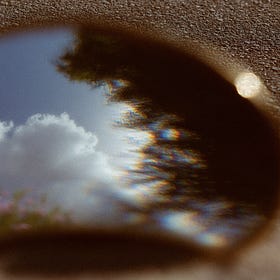There’s something strangely mathematical about how loss compounds. Not the clean arithmetic we learn in classrooms, but the strange algebra of human endurance, where each subtraction somehow multiplies our capacity to contain what seems impossible. The summer after my high school graduation, I learned this equation by heart.
It started with my great-grandfather dying in his sleep on his 99th birthday. My great-grandmother, who'd been married to him for pretty much forever, took it about as well as you'd imagine someone would when half their heart gets ripped away overnight.
Then my grandmother, who'd been battling emphysema for years, suddenly got worse. Really worse. The kind of worse where you spend a week in the hospital watching machines breathe for someone you love while your grandfather tries to juggle planning his father's funeral and comforting his devastated mother and making impossible decisions about life support.
I remember standing in that hospital room the day we took her off the machines. Everyone was crying—the soft, careful crying people do around death beds. But my cousin and I just... weren't. Not because we didn't care, but because we'd watched her struggle to breathe for so long that this somehow felt like relief wrapped in sorrow. My grandfather handled it the way you handle anything impossible. You just do it, one decision at a time. He signed the papers. He held her hand. He did what needed doing.
And then exactly a week later, because apparently the universe wasn't finished with its lesson, my great-grandmother fell and hit her head. Brain hemorrhage. Back to the hospital, back to the machines, back to my grandfather having to make the same terrible choice for his own mother that he'd just made for his wife.
Six weeks. Three deaths. One eighteen-year-old watching her grandfather become the reluctant choreographer of goodbye after goodbye. I remember standing in that final hospital room, surrounded by the familiar soundtrack of grief yet again—the soft crying, the whispered prayers, the careful rustling of tissues.
Watching my grandfather navigate those weeks taught me something about the architecture of strength. And this is how I first learned about extremity, I think; how it expands not just our tolerance for pain, but our capacity for complexity. In ordinary moments, we experience one thing at a time—happiness or sadness, hope or fear, gratitude or grief. But crisis demands that we hold multitudes. I learned to be devastated and practical simultaneously, to grieve while making funeral arrangements, to comfort others while processing my own bewilderment.
"The heart that breaks open can contain the whole universe," Joanna Macy once wrote, and I think she was speaking to this strange mathematics of human resilience—how our breaking becomes not diminishment but expansion. How we discover we can hold so much more than we ever imagined.
We think of strength as something solid, immutable—a mountain that weathers storms unchanged. But I learned that summer that real resilience is more like water: it takes the shape of whatever container it finds itself in, flowing around obstacles, adapting endlessly to the terrain of necessity.
That summer taught me that we are not the fragile creatures we imagine ourselves to be. We can bend without shattering, we can absorb impacts that should destroy us and somehow continue. We learn that our emotional range is far wider than we suspected, that we can experience profound sadness and profound peace in the same breath, that love persists even as its objects disappear.
Sometimes I wonder if this is why the hardest lessons can't be learned any other way. Not because suffering is somehow noble, but because only in extremity do we discover the true dimensions of what we can contain. The weight we didn't know we could carry becomes proof of strength we didn't know we possessed.
That summer, I learned I was larger than I knew. More complex. Capable of holding grief and gratitude, devastation and peace, all at once. And maybe that's the real gift hidden inside our most difficult seasons—not just surviving them, but discovering who we become in their midst.
I think about this now when I find myself in other impossible territories—not always loss, but those moments when life demands more than I think I can give. The job that requires skills I don't have yet. The relationship conversation I've been avoiding. The decision that has no good options. There's something different about how I approach these things now, a kind of quiet confidence that has nothing to do with knowing I'll succeed and everything to do with knowing I'll expand to meet whatever comes.
Sending you all love.
XO, STEPFANIE
MORE TO EXPLORE 🐆
memes are the new folktales
Something extraordinary is happening to human storytelling, and we're living through it in real-time.
when the ground beneath you breaks open
There’s something kind of cruel about the way wisdom works. It refuses to arrive during the easy seasons, when we have space to receive it gracefully. Instead, it waits. It lurks in the margins of our carefully constructed lives, patient as winter, until the moment when everything we thought we knew begins to fracture—and then, only then, does it step forward with its terrible gifts.
the currents within us
There are mornings when I wake and feel the day waiting like an open door, when words arrive before I've even thought to call them, when my body moves with an ease I forget I'm capable of, when the s…








